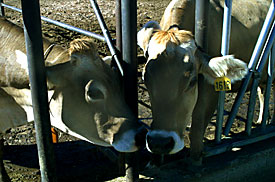 |
|
JILL MARICICH/Arizona Daily Wildcat
|
Two Brown Swiss cows at the UA Campbell dairy farm peek their heads through the fence of the enclosed area where experimental cows are kept.
|
|
By Rachel Williamson
Arizona Daily Wildcat
Monday November 25, 2002
Researchers think cows' anticarcinogenic fatty acids may prevent disease
Milk and beef might be able to help in the prevention of breast, stomach and skin cancers with the help of animal science research being done at the UA.
Although the fat in milk and beef is often viewed as unhealthy, it actually contains cancer-preventing components. The most potent anticarcinogen, which is actually contained in trace amounts in milk and beef, is a group of fatty acids called conjugated linoleic acids or "CLA."
Because of its cancer-preventing power, CLA has been heavily researched since the mid-1990s, said Lance Baumgard, assistant professor of animal science. CLA prevents the uncontrolled cell growth that causes cancer.
Although red meat has been thought to be a cause of cancer, that idea is just an urban legend fueled by the claims of nutritionists and scientists, Baumgard said.
"We've been told that (red meat causes cancer) for years," Baumgard said. "The hypothesis is there, but it cannot be proven."
With the help of animal science graduate students Hank Hafliger and Octavio Mendivil, Baumgard is altering the diet of cows in order for them to produce high concentrations of the group of fatty acids, CLA.
"Ten years ago, no one would ever say that fat is good for you," Baumgard said.
Although CLA has only been tested on lab animals, the evidence that it could prevent cancer in humans is pretty convincing, Baumgard said.
Plus, CLA consumption will not cause any harmful effects for humans, Baumgard said.
CLA can even be purchased in health food stores as a dietary supplement, Baumgard said.
The powerful anticarcinogen is naturally produced by "ruminant" animals, which have the right kind of digestive system to break down certain plants.
Ruminant animals include cattle, sheep, goats and deer that can change the composition of plant materials. In that process CLA is formed. Mendivil and Hafliger are feeding cows different amounts of vitamin E to increase CLA concentrations.
Hafliger examines CLA levels in cow milk and Mendivil studies it in beef. So far, few people outside the medical community know about the benefits of CLA, Baumgard said.
If their research can prove that it is possible to increase CLA levels in milk and beef, and studies continue to show the healthful benefits of CLA, public demand for CLA-enhanced dairy and meat products will increase, Mendivil said.
CLA can be beneficial for even more than the prevention of cancer. The anticarcinogen can be an immune system stimulant for people with HIV and others with weakened immune systems.
It might also help in the prevention of heart disease and diabetes, decrease body fat and alleviate symptoms of lupus.

